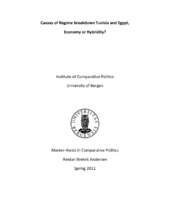| dc.description.abstract | This analysis tests regime-related and economical explanations for regime breakdowns in Tunisia and Egypt. Generalizations from four large N-studies are used to find out if the two breakdowns find themselves within the scope of these generalizations where GDP per capita, regime power-base, hybrid regimes, diffusion and former liberalizations are the main factors of explanation. As positioning in the Middle East is also mentioned as a variable delaying regime breakdown, a set of other Arab countries are added to the plot in an attempt to analyze what is often known as the Middle Eastern exceptionalism" in regime research. The results are somewhat surprising, and the variables that seem to be the most powerful are not the economical ones, but rather those of power-base of the regimes, former liberalizations and diffusion. The diffusion variable is discussed on different levels, both as diffusion between regimes in different kinds of networks, and on sub-regime level in the form of social Medias and satellite TV channels. The power base of the regime seems to be of more importance for the regime breakdowns than degree of system hybridness. The presence of democratic institutions in the two regimes did probably not pave the way for more democratic reform, but rather delayed the regime breakdown by co-opting opposition forces giving the regime a democratic alibi. The military is added as a country-specific short-term variable, and the expected importance is confirmed in the analysis. | en_US |
